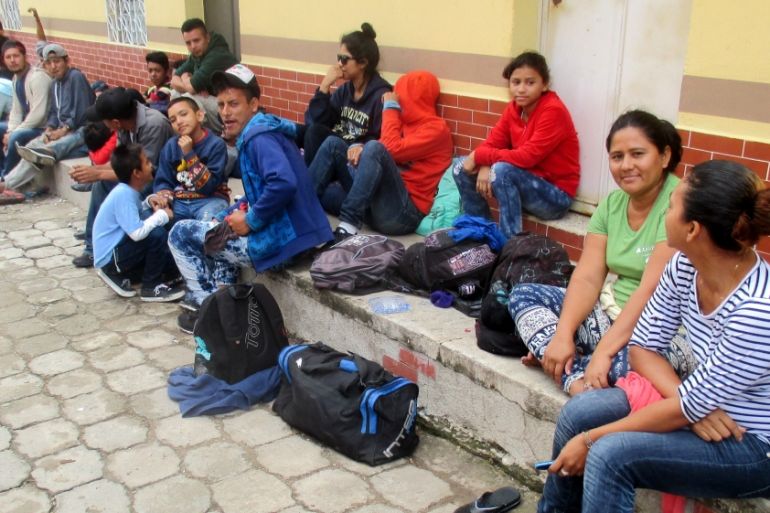Honduran women find safety in numbers in migrant caravan
Thousands of Hondurans facing violence and unemployment cross into Guatemala heading for Mexico.

Esquipulas, Guatemala – Maria Adela Vasquez does not want to be here. Waiting inside a migrant shelter in southern Guatemala, along with her daughter and niece, she hopes to continue her journey north and into Mexico.
Vasquez is from Tegucigalpa, the Honduran capital, where along with her 17-year-old daughter run a small street-side food stall.
But things took a turn for the worse when local gangs and criminal groups began extorting them for money and threatened their lives.
“They do not forgive. They do not care what kind of business it is. Money is what interests them,” Vasquez told Al Jazeera on Saturday.
“They threatened her (daughter) and said if she did not pay they would kill her.”
Worried for her daughter’s safety, Vasquez decided to flee Honduras with her and her niece after seeing the news about the caravan of thousands of migrants and refugees heading north.
The route though can be dangerous, especially for women, so Vasquez is relieved to be with others. After crossing the border into Guatemala on Friday in a group of 17 people, including children, she joined many others 10km up the road, at the Casa del Migrante Jose shelter in Esquipulas.
“We came with company. It gives us a bit more strength and security,” said Vasquez.
![Women and girls make up nearly half of the first wave of the exodus [Sandra Cuffe/Al Jazeera]](/wp-content/uploads/2018/10/aa42a468ce8549669aed66223566c942_18.jpeg)
More than 1,000 migrants and refugees set off on foot and on buses from northwestern Honduras on October 13, with numbers quickly rising to include several thousand more.
Thousands of Hondurans have already made it across Guatemala’s northern border into Mexico, and groups of varying sizes are following behind throughout Guatemala.
|
|
Hundreds of others continue to flee every day in the hope of reaching Mexico despite the fortified borders, blockades, police checkpoints and fences they face along the way.
Meanwhile, US President Donald Trump continues to demand governments in the region halt the exodus and take people back to Honduras, threatening to cut off aid to the governments of Honduras, Guatemala, and El Salvador.
In a tweet last week, he also threatened to call in the army and shut the southern border of the United States.
Escaping violence
Women and girls make up nearly half of the first wave of the northbound exodus, according to statistics released on Saturday by officials from a shelter in southern Mexico.
Of the 5,109 people accounted for, 1,565 are women and 952 are girls.
Honduran women such Vasquez, her daughter and her niece say they find safety in numbers. The route into and through Mexico can be dangerous for undocumented Central Americans.
Tens of thousands of migrants and refugees have gone missing along the way over the years, according to estimates by migrant rights groups, and many women and girls have been sexually assaulted.
Reina Madrid, a 33-year-old mother of four, crossed over into Guatemala the same day as Vasquez, but with a few hundred other people. Violence against women is a risk along the route through Mexico, but it is also a reality at home, she told Al Jazeera.
For years, Honduras has had one of the highest per capita homicide rates in the world. More men than women are murdered, but the lack of justice plagues both.
In roughly 90 percent of all homicide cases in Honduras, no one is arrested or prosecuted.
The few successful investigations into killings of women are often homicides committed by husbands, boyfriends and ex-partners, a majority trend in much of the world. But the homicides that remain in impunity can be brutal.
![Honduras has had one of the highest per capita homicide rates in the world [Sandra Cuffe/Al Jazeera]](/wp-content/uploads/2018/10/814aa5c617954eedbbfdf0025a63630e_18.jpeg)
The word “encostalado”, which roughly translates as “in a sack”, has become part of the Honduran national vocabulary.
|
|
It refers to dismembered corpses found stuffed in large sacks, often at the side of roads and highways. Both men and women are sometimes killed in this manner.
“A woman’s life is worth nothing [in Honduras]. They are found in sacks,” said Madrid. “Nothing is done.”
Madrid is staying in Esquipulas, for now, to look for work, while Vasquez hopes to do the same in Mexico.
Although many migrants and refugees are hoping to push further north into the US, an increasing number of them now have plans to settle at different points along the way.
On Sunday, Vasquez, her daughter and her niece finally set out from the Esquipulas shelter, walking north with a large group.
More migrants and refugees crossing the border from Honduras into Guatemala have already taken their place at the shelter.
|
|